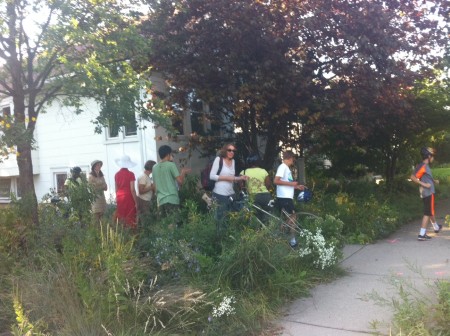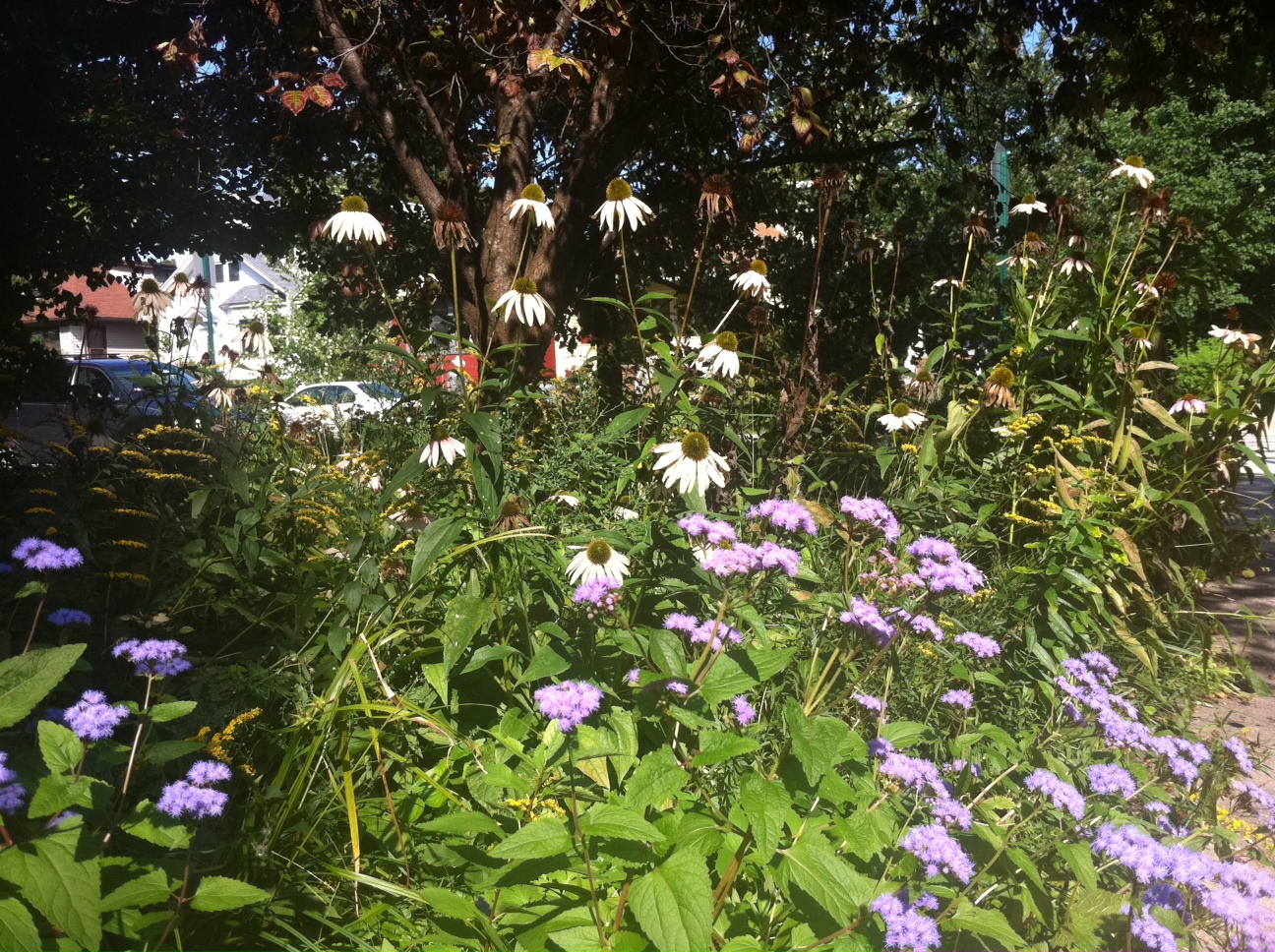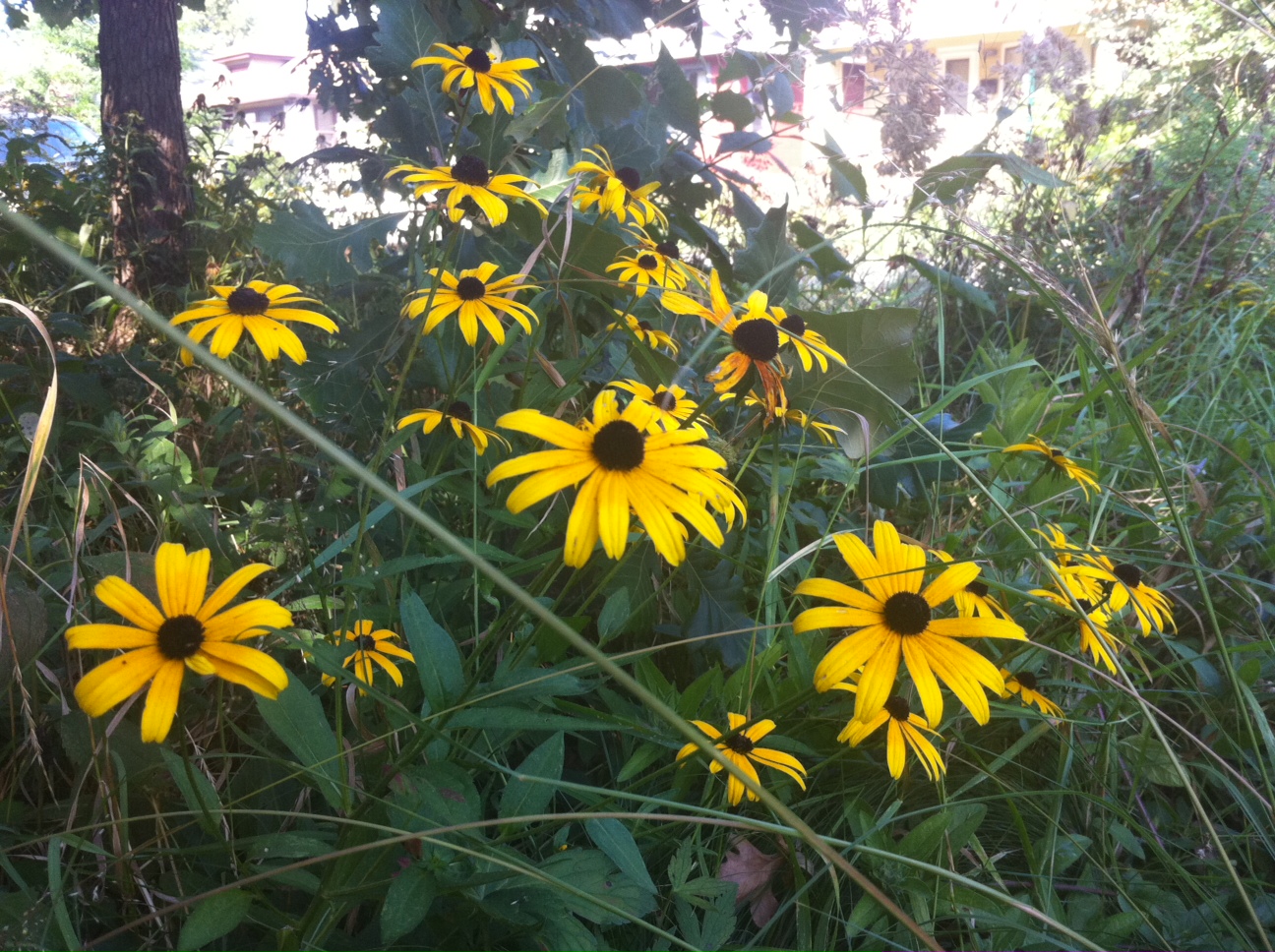Triton College’s Green Drinks Series will feature Michael Howard with the theme, “Reconnecting Urban Audiences to the Land: Lessons from an Urban Agriculture Program,” from 6:30 to 8:30 p.m. Wednesday, April 8. Michael founded Eden Place Nature Center and Urban Farm by cleaning up an illegal dumpsite, with help from family and friends, in his Fuller Park neighborhood on Chicago’s South Side. This urban oasis now educates youth and their families about environmental stewardship via wetland, prairie and woodland. Learn more here. The Green Drinks Series is a free, public event with a cash bar, snacks, and plenty of time for networking. Location is Triton College Student Center, Room B-223, 2000 Fifth Ave., in River Grove.
Arboretum Progress Update
Oak Park might become the second town in the country, and the first in Illinois, to be certified as an arboretum. Oak Park Village Forester, Robert Sproule, made this announcement on Sunday, March 22, at the meeting of The Learning Gardens of Oak Park. The Village of Oak Park in cooperation with the Park District of Oak Park submitted an application on March 13, to the Morton Arboretum to have the trees in the parks and on the parkways of Oak Park certified as an arboretum and are awaiting final approval.
Native Plant Orders Due March 31
Gardening with natives has never been easier, thanks to West Cook Wild Ones. For the next two weeks, you can order all of those hard-to-find natives that will make your yard come alive again with birds, bees, butterflies, and unique flowers, grasses, trees and shrubs - then drive by and pick up your plants at Dominican University in River Forest on May 17.
Backyard Prairies--Why Create a Wildlife Corridor?
Oak Park Moves Toward Arboretum Accreditation
When we think about nature in winter, we may think about snow, ice and gray skies. We may think about squirrels, and maybe cardinals. This is also the time of year when the graceful architecture of trees is starkly visible. Trees give us so many important gifts: cleaner air, fresh oxygen, stormwater management, shade, even energy efficiency for buildings. How well do you know the trees around you?
Green Living: Tree Health Begins with the Soil
We benefit tremendously from having trees in our yards, parks and along our greenways. They save energy, reduce heating bills and increase the value of our homes. Because they give so much, we should give back to them. How can we? It all starts with the soil, said arborist Dan Krug, who gave a two-hour talk, “Caring for Trees by Caring for the Soil: Good Dirt,” hosted by West Cook Wild Ones on Sept. 21 at Dominican University. Krug covered soil composition and chemistry and the importance of mulching.
Trailside Museum Fall Schedule
Throughout the fall: Programs that repeat
“Woodpecker Hollow” Nature Play Area:
Balance on logs and build with sticks as you experience unstructured playtime in our nature play area. Every day
Bone Appétit
Join us at feeding time to learn about Trailside’s outdoor resident animals: Monday, September 1; Sunday, September 13; Sunday, October 12; Sundays, November 8 & 22; Tuesday, November 11; Saturday, November 30 • 1 pm
Nature Story Time
Nature-inspired stories followed by a craft. Ages 3-6 with adult. $1 per child.: Thursdays, September 4 & 18; October 2 & 16; November 6 & 20 • 10:30 am
Dog Days Walks
Bring your well-mannered, leashed dog on a one-hour guided hike on our trails. Call to register by 2 days prior. Saturdays, September 20, October 18, November 15 • 10 am
Autumn Walks
Explore the changing seasons on a guided walk along our trails and around the pond. Call to register by 2 days prior. Sundays, September 28, October 5 & 19, November 2 & Monday, October 13 • 1 pm
Weekday Nature Walk
Join us as we explore our local trails near Trailside Museum: Tuesdays, September 30, October 28, November 25 • 1 pm
Homeschool Connections
Join other homeschoolers to learn about local nature. Limited space available; register at least 2 days prior to each session. Must be accompanied by adult.
Tree Ecology Learn about trees many important roles in our ecosystems, and learn to identify some of our local trees. Children ages 8 & up; Wednesday, September 24 • 2 – 3:30 pm
Migration Beyond Borders
Learn the migration stories of birds, insects and reptiles connecting to habitat preservation. Children ages 8 and up. Wednesday, October 22 • 2 – 3:30 pm
Ready for Winter
Learn about different animals’ strategies for surviving seasonal changes in order to prepare for winter. Children ages 8 and up. Wednesday, November 19 • 2 – 3:30 pm
Conservation History Series
Join interested adults and teens to learn about our leaders in conservation. Limited space available; register at least 2 days prior to each session.
Conservation in America: Explore the ideas and practice of conservation from before Thoreau to 21st century conservation biology. Wednesday, September 17 • 7 pm
Origins of the Forest Preserves: Learn how the nation’s first forest preserves were created in a time of great social change. Wednesday, October 1 • 7 pm
Leaders in Conservation: Aldo Leopold, Learn about the man many believe to be the father of the conservation ethic.Wednesday, November 19 • 7 pm
September
Start Your Nature Journal
Learn and practice tips for starting or enhancing your journal, from pen and paper as well as your favorite smartphone apps. For adults and interested teens; bring your favorite technology if you like. Registration required by 9/4, $15.00/person includes take-home materials. Saturday September 6 • 1 pm
What Leaf Is That? Tree ID for Young People: Enjoy a short nature walk and learn easy ways to identify some trees by leaf, bud, bark and fruit. Children ages 7 – 14, w/adult. Registration required by 9/5. Sunday, September 7 • 1 pm
Killer Plants and Murderous Mushrooms: Learn how some plants and fungi defend themselves, and then follow a naturalist in search of examples in our preserves. For adults and youth 12 and up; registration required by 9/12. Sunday, September 14 • 1 pm
Animal Olympics: Can you leap as far as a frog, or spear fish like a heron? Test your human abilities against amazing animal adaptations. Drop-in family program. Sunday, September 21 • 1 – 2:30 pm
The Endless Garden - Seed Saving: Learn how and when to save and store seeds from your garden plants for next year’s growing season. For adults; register by 9/25. Saturday, September 27 • 1 pm
OCTOBER
Fungus Among Us Learn about some common autumn mushrooms then enjoy a short hunt for local examples. For adults & interested teens. Registration required by 10/2. Saturday October 4 • 1 pm
Tree Identification Workshop: In this indoor/outdoor workshop we will discuss features of local trees used for tree identification, such as bud and leaf shape, habitat and bark. Adults & interested teens. Registration required by 10/9. Saturday, October 11 • 1 pm
An Evening at Trailside
Get up close and personal with your neighborhood nature center. Sample a variety of educational programs and crafts, chat with your local naturalists and get an up close view of our entire mammal furs & skulls collection. A rare “behind-the-scenes” program will show you how we prepare food for our display animals.
Friday, October 24 • 5 – 8 pm
Photo Meet-Up at Trailside: Photographers of all skill levels are welcome to enjoy a one-hour tour of Trailside Museum and Thatcher Woods, highlighting the autumn color, scenic vistas and locations frequented by wildlife. During and after, photographers are free to get their best nature shots! Saturday, October 25 • 10 am
The Eyes Have It Drop-In Learn how other animals see: from snake eyes that never close to the compound eyes of insects. Drop-in family program. Sunday, October 26 • 1 – 2:30 pm
NOVEMBER
What Does the Coyote Say? Bark, howl or yip…discover what the coyote really says and visit with Trailside’s resident coyote. Saturday, November 1 • 1 pm
On the Trail of the White-tailed Deer The white-tailed deer is the largest mammal in Illinois. Join us as we explore the natural history of this native animal. Drop-in family program. Sunday, November 9 • 1 – 2:30 pm
Nature Sketching Explore line, value, shading and form as we practice sketching plants and animals from life. Register by 11/13. $15 materials fee includes take-home artist’s tools. Sunday, November 16 • 1 pm
Skull Detectives - The Mystery of the Missing Lunch Use the clues from real skulls to figure out which animal stole the missing lunch. Drop-in family program. Sunday, November 23 • 1 – 2:30 pm
Turkey Trot Hike Walk off that turkey dinner on a special post-holiday guided hike of the trails around Trailside Museum. Registration required by 11/26. Friday, November 28 • 1 pm
The Flying Meat-eaters: Hawks, Owls, Falcons & Vultures Drop in to learn about the life history of the carnivorous birds of our area. Family drop-in program. Saturday, November 29 • 1 - 2:30 pm
Trailside Museum, Forest Preserves of Cook County, 738 Thatcher Ave, River Forest, IL 60305, (708) 366-6530
"Birds, Bees & Butterflies Native Garden Tour" gets enthusiastic response
The September 7th Birds, Bees & Butterflies: A Native Garden Tour hosted by West Cook Wild Ones and Green Community Connections drew more than 140 experienced and beginner native plant gardeners and those wanting to learn what this was all about. They came from near (Oak Park, River Forest, Forest Park, Berwyn and Cicero) and farther—Plainfield, Downers Grove, Elk Grove Village and various parts of Chicago — to visit 11 residential and public gardens. More than 40 homeowners, master gardeners, volunteers, sponsors and Forest Preserve staff members also helped to make the afternoon a rich, educational - and fun! - event. The West Cook Wild Ones Wildlife Corridor also received a lot of attention at the event, and more people pledged their gardens to be part of it. The Wildlife Corridor is envisioned as a contiguous swath (at least 2 per block) of native gardens in residential and public spaces from Columbus Park in Chicago to Thatcher Woods in River Forest. Watch for more detail and ways to be involved in this unique and important project which will be coming soon.
After the garden tour, we informally surveyed participants and volunteers. We thought we'd share some of their enthusiasm, in hopes that through the upcoming, long winter, you might get inspired to plan some new native plantings in your own yard:
photo (20)
“It was reaffirming to see that native garden lovers are so aware of the need to use non-toxic products to help their gardens grow!”
“It inspired my sister [who was visiting from Pennsylvania] to start a garden!”
“I was reminded how important it is to see other people’s gardens and share information, as we can always learn more.”
“The children (and adults!) really enjoyed the impromptu live insect displays, like the katydid I found on my car bumper and the caterpillar found in the forest preserve garden. We provided them a small habitat for the day and released them at the end of the event.”
“The aliveness of the gardens seemed to energize the people that visited them. We went away smiling after watching the butterflies, bees and birds in the gardens.”
“Even the most experienced native gardener I know came back telling of seeing a rain garden on the tour and being emboldened to try one in his own gardening.”
“We want to host a garden tour like this one in our town!”
Read Ginger Brown Vanderveer's (West Cook Wild Ones co-founder) article on what native gardening means to her. She led 28 participants on a guided bike tour of six of the gardens during the event.
Stay tuned for more native gardening events next spring:
One Earth Film Fest showing of “Hometown Habitat,” in March 2015
Wild Ones Native Plant sale in May
Special guest speaker, Doug Tallamy, author of Bringing Nature Home, will come in May to share his unique perspective on bringing nature to urban areas as our rural lands become more developed or inhospitable due to industrial agriculture methods and increased use of pesticides.
“Unless we modify the places we live, work and play to meet not only our own needs, but the needs of other species as well, nearly all species of wildlife native to the United States will disappear forever. . . There is, however, a way out of this mess . . . Evidence suggests that . . . most species could live quite nicely with humans if their most basic ecological needs were met.” — Douglas W. Tallamy, Bringing Nature Home
BlackSwalltailMaleGinger3.
Walking the Talk: Douglas Chien's Urban Native Garden
Douglas Chien's Oak Park garden is attractive, colorful and full of life — and full of native plants. His garden was one of eleven featured on the September 7th, Birds, Bees & Butterflies native garden tour, which was co-sponsored by Green Community Connections and West Cook Wild Ones. In fact, many birds (including a female goldfinch), bees and quite a few species of butterflies appeared in his garden that day. Plus, more than 70 people came through for a tour. Douglas, the Advocates' Network Manager with Friends of the Forest Preserves, explained to visitors how he created his native plant oasis in the heart of West Cook County. About 12 years ago, Douglas and his partner Michele Gurgas bought their Oak Park home on a corner lot, which had a traditional landscape highlighted by lawn and two large American elm trees gracing the parkways. But within the year, the trees succumbed to Dutch elm disease and were taken down.
To take advantage of the new, plentiful sunshine, Douglas planted two young native trees in his front yard: an American plum and a pagoda dogwood. In addition, he asked the village to plant a bur oak in the parkway.
 "I requested that the village buy the tree from Possibility Place Nursery, which specializes in native plants that are local ecotypes," says Douglas. Local ecotypes are plants that were propagated from parent plants that have been growing in our specific area for hundreds or even thousands of years. Today, his well-adapted bur oak has a graceful structure and is healthy and vigorous.
"I requested that the village buy the tree from Possibility Place Nursery, which specializes in native plants that are local ecotypes," says Douglas. Local ecotypes are plants that were propagated from parent plants that have been growing in our specific area for hundreds or even thousands of years. Today, his well-adapted bur oak has a graceful structure and is healthy and vigorous.
These three trees form the basis for a savannah ecosystem in his east-facing front yard. On the ground, a mix of sun- and shade-loving plants mingle, including wild ginger, five species of milkweed, pale purple coneflower, three goldenrod species, American beak grass, trout lily and Joe Pye weed.
 Along the sunny, south side of his home, Douglas has built a prairie in the parkway. Purple prairie clover, several aster species, prairie dock and a variety of grasses and sedges smile at the sun.
Along the sunny, south side of his home, Douglas has built a prairie in the parkway. Purple prairie clover, several aster species, prairie dock and a variety of grasses and sedges smile at the sun.
"I recommend to people who want to plant a native garden that their plant mix include at least 50 percent grasses and sedges," Douglas says. "They provide support to the flowering plants. Grasses and sedges also compete for space and nutrients, so the flowering plants don't get too tall and leggy."
He also adds: "Density and diversity are key to a successful native garden. You want as many different kinds of plants planted very close together. Planting on 12-inch centers, like typical ornamental gardening, leaves room for the weeds."
 Native habitats need to be burned so they can stay healthy, seeds can germinate and weeds stay under control. Douglas worked with the Village of Oak Park two years ago to change local ordinances. Now residents who go through an application process and obtain proper permits can burn their native landscape yards.
Native habitats need to be burned so they can stay healthy, seeds can germinate and weeds stay under control. Douglas worked with the Village of Oak Park two years ago to change local ordinances. Now residents who go through an application process and obtain proper permits can burn their native landscape yards.
"When I first moved here and started planting natives, everyone else on the block had traditional landscapes," says Douglas. "But today, many more people on my street are planting natives."
And that's a good thing, not only for the birds, bees and butterflies, but for other wildlife, the soil and the people who live here, too.
For more information, you can contact Douglas at 708-763-0953 or dskchien@sbcglobal.net
How "Sculpture Saves the Trees" - September 23rd, OP Main Library
Margot McMahon Tells How "Sculpture Saves the Trees" Sept.23 at Library: Ten sculptors including Margot McMahon of Oak Park worked through Chicago Sculpture International and teamed with the Chicago Park District to keep dead trees from being removed by sculpting them. McMahon carved and painted 13 flying song birds and an owl from a 200-year old tree that toppled in a wind storm in her back yard on Humprey Avenue. These birds now perch on her Jackson Park Tree along Lake Shore Drive south of 57th Street to remind commuters to reduce their carbon footprint. Meet sculptor Margot McMahon and see the birds she carved that are now part of this innovative project on Tuesday, Sept. 23, at 7 p.m. at the Oak Park Public Library.












